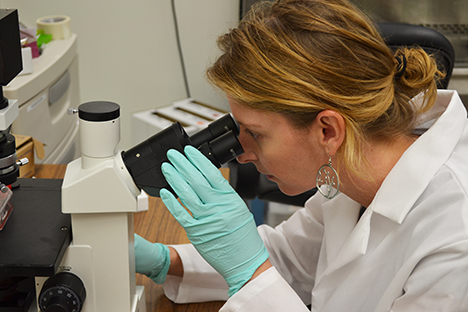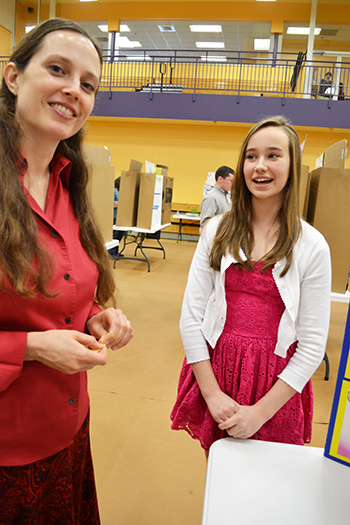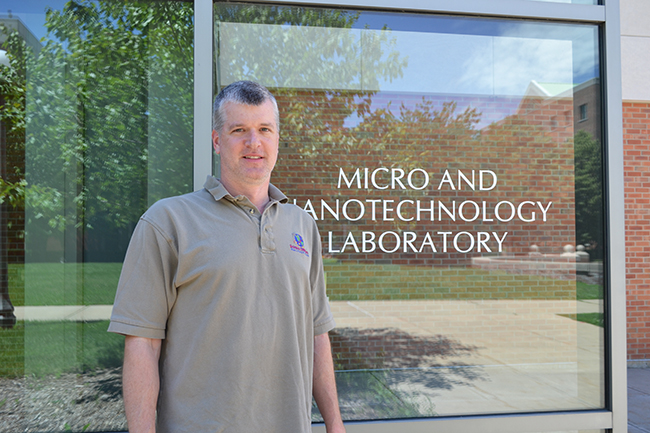Local Science Teachers Experience Research in NanoTechnology

A local science teacher, Aubrey Wachtel, performs research on quantum dots in an Illinois lab.
July 9, 2014
For the next three years, a number of area science teachers will have an opportunity to participate in the Nano@illinois RET, where they will not only learn about, but actually participate in, cutting edge research in nanotechnology and even adapt some of what they have learned for students in their classrooms.
Funded by the National Science Foundation through its Research Experience for Teachers (RET) program, Nano@illinois is providing research experiences for four local teachers during its first summer of operation. According to RET Coordinator Carrie Kouadio, while the main thrust is for teachers to have an opportunity to do research, the program’s creators intend for teachers to receive several additional benefits while participating:

Carrie Kouadio (left) interacts with a student at a local science fair Kouadio helps organize.
“The big overarching goal is that these teachers will gain experience in research in cutting-edge, world-class laboratories with outstanding faculty in science and engineering for the purpose of increasing content knowledge, increasing lab skill knowledge.”
In addition to increasing knowledge about the subject matter, teachers will also develop materials students in their own classrooms will be able to use. The program's professional development will guide them in creating “high-quality modules that are based on the research that they did in the summer that they can disseminate with their students, schools.”
Their own students are not the only ones who will benefit: these multi-day modules will include an instructional guide for teachers, student resources, and a PowerPoint. Thus other teachers across the nation will be able to use them with their students as well. “The resources they create are going to be disseminated nationally through various hubs,” adds Kouadio.
She also expects participants to have enough “meat” to actually write articles about what they’ve done to submit to various science education journals.
Since the summer of 2014 is the program's first year, rather than recruiting the full complement of teachers, RET planners decided to start small with only four. “This year,” says Kouadio, “we’re trying to set the vision for what the program is going to look like in summers of 2015, 2016, and 2017, when we’ll have our full cohort of 14 teachers.”
The teachers are from both large urban high schools, and smaller rural schools: Champaign’s Central, Mahomet Seymour, University Laboratory, and Villa Grove. In addition, teachers were intentionally chosen from several disciplines: chemistry (two), biology, and physics. Says Kouadio: “We also wanted to go across the content areas so we get a sense of building the program for the future.”
She also says that they chose participants who would help shape the program for the remaining three years: “We definitely looked for teachers who were outstanding applicants, but also teachers we thought would be able to contribute to the development of the program. So people who gave us indication that they would be able to give guidance on what’s good, what needs to be improved, would be able to think about envisioning the program for future years. So that was very important for this year.”
What does Kouadio hope the teachers get from the experience? “I want them to have a really meaningful lab experience,” says Kouadio, “to feel like they learned new skills, new content knowledge in the lab; to feel like they can apply the things they learned to their own classroom so that their students can benefit and other students more broadly can benefit. Also, I hope that they will find the professional development sessions very useful."
Story and photographs by Elizabeth Innes, Communications Specialist, I-STEM Education Initiative.
More: MNTL, Nano@illinois, RET, Summer Research, Teacher Professional Development, 2014
For additional istem articles on the Nano@illinois RET, please see:

2014 RET Participant Dan Reed, a physics teacher for Champaign Central High School.













.jpg)
















